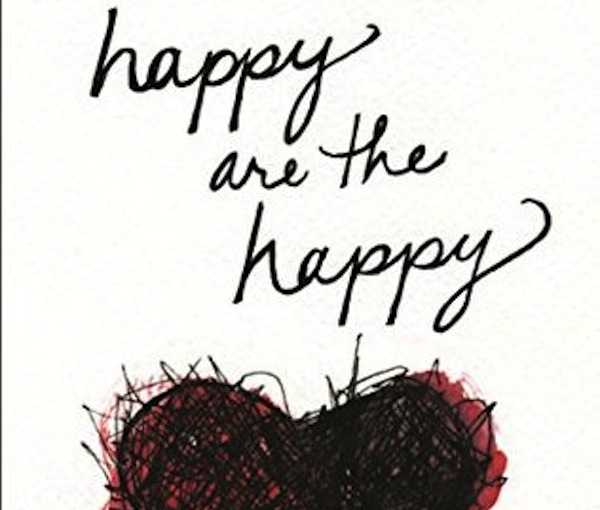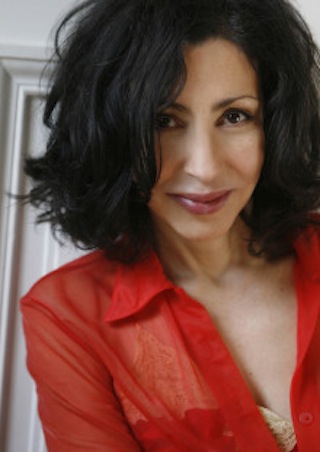Book Review: “Happy Are the Happy” — You Can’t Get There from Here
Yasmina Reza’s dollhouse of a novel is a miniaturist’s miracle.
Happy Are the Happy by Yasmina Reza. Translated from the French by John Cullen. Other Press, 160 pages, $20.

By Ted Kehoe
“In the end, the only truly intimate relationships are between two people.” So says Pascaline Hunter of her and her husband’s trying to maintain a friendship with another couple in Yasmina Reza’s new novel Happy are the Happy. This statement is a perfect representation of the book — a seemingly self-evident sentiment (like the tautological title), which on closer inspection reveals itself as a subtle paradox (because any social group larger than two is comprised of people who know each other individually, so how does that work?). But also, like the title, there is a built-in intimation of failure. (The title here might well continue …and Everyone Else is Miserable.) In the Hutners’ case, the Toscanos can never really understand what the Hutners’ married life in tandem is like and the Hutners can never articulate the experience anyway. This quotation also functions as a guiding precept in this novel, where so much is about the inability of the individual to find a secure place in the group.
Yasmina Reza’s dollhouse of a novel is a miniaturist’s miracle, comprised of twenty-one brief chapters, each titled with the name of the character who narrates it. The bulk of Reza’s oeuvre is plays (she has won two Tony Award) and the short chapters here have the feel of monologues. All the characters are bound to one another, as family or friends or lovers; a few reprise their roles as narrators. As with any good first-person narration, we get a sense of who these people are by what they say and what they choose to talk about. The book’s dollhouse atmosphere is reinforced by the characters’ focus on the seemingly banal: shopping trips, a driving lesson, a guys’ weekend, a teenager’s obsession with a pop star, a speech made to a civic group. But we quickly get the sense that something darker, often funnier, and thus sadder, is wriggling beneath the glazed surfaces — wars of attrition between spouses and lovers, disappointments at every turn, generalized feelings of dispossession.
Reza’s great skill here is in toggling between the tragic and ridiculous in a way that reflects her characters’ own disorientation. Reza accomplishes this with her use of muted but expressive detail, as in the variety of cheeses Robert Toscano selects at the market which, to his wife, reveals his selfishness, or the dress that proves to be contested territory between Jeanette Blot and her daughter, or the way that Paola Soares suddenly focuses on the shade of turquoise of the couch behind her lover as he is undressing. The particular physical properties of these everyday objects are imbued with terrible depths of emotion and become heartbreaking precisely because the objects are so commonplace—“so much depends / upon / a red wheel / barrow.”

Yasmina Reza — her dollhouse of a novel is a miniaturist’s miracle. Photo: V Pascal Victor/ArtComArt.
There are many funny and lonely and puzzling moments here. Jeannette Blot’s catastrophic driving lesson is great. Philip Chemla’s assignation with the Egyptian boy and Luc Condamine’s casual sexual brutality make for disturbingly strange episodes. But the standout is Jacob Hutner’s obsession with Celine Dion. I get the sense that Reza is particularly taken by this character because he appears several times throughout Happy are the Happy. Jacob is at first a fan of Celine Dion, then begins impersonating her for his parents’ amusement, then fully adopts her persona and disappears inside the fantasy. Celine Dion is ridiculous enough of an icon for a teenage boy to fixate on, but his behavior — veering from inside-joke to full-blown insanity — evolves into the horrifying. His parents suddenly find themselves on the other side of a wall from their son; I was put in mind of Miranda July and how quickly events in her stories can skid from twee to grim.
The novel doesn’t ultimately succeed because of its segmented structure. In fact, it’s difficult to conceive of this volume as a novel by any standard definition. As in a dollhouse, very little of the drama that plays out in the various rooms seems overtly connected to any other, except by proximity. There are domestic themes at play here; the characters are friends or family or lovers. But Reza doesn’t try to draw the reader inexorably into the thrust of the narrative, the momentum of a storyline. Absent this, we are left to supply connections that are, at best, abstract—It’s impossible to ever really know anyone—or at worst, trite—our lives are all connected. Then, there is the format of the text itself. In each chapter, a wall of prose greets the reader without even a paragraph break for a new speaker in the dialogue. We receive the text in short, dense bursts and the chapters cut off abruptly. We’re pulled out of one character’s head and dropped into another’s. This too adds to the leveling effect, a flattening of the amplitude of a traditional novel. The relationships between Reza’s characters generate little emotional pressure, so that the scenes of infidelity and marital strife contain the same tension as disagreements among bridge partners.
Reza’s sense of how, and over what, the grandeur or grandiosity of our lives plays out is, admittedly, pitch perfect. The mood of a romantic evening abruptly shifts over nothing more than a careless remark. An error a spouse makes, as a partner in a card game, becomes a symbol of their entire married life. The urn full of ashes must be carried home in something. Is a gym bag more or less absurd than a shopping bag? Than a purse? Than a suitcase? “What makes you think that confronting reality soothes the heart?” one of her characters inquires, and that is the conflict at the heart of many of these characters’, and often our own, unhappiness. If we could peer into the rooms of others like those of a dollhouse, would access to these strangers’ lives provide insight into our own? Look around you all you want but you still won’t see. Happy are the happy, and you can’t get there from here.
Ted Kehoe was a teaching/writing fellow at the Iowa Writers’ Workshop. His fiction has appeared in Ploughshares, Epoch, Southwest Review, Prairie Schooner, and Shock Totem. He won Prairie Schooner’s Bernice Slote Award for Best New Author. He teaches writing at Boston University.
Tagged: French literature, Happy Are the Happy, John Cullen, Other Press, Ted Kehoe, translation
